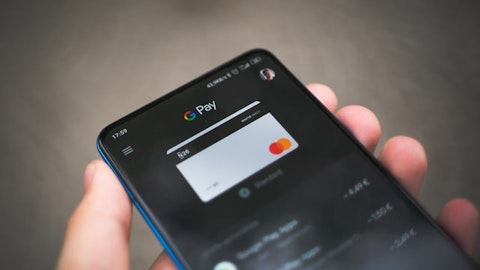Operator: Thank you. Our next question comes from the line of Andrew Bauch with Wells Fargo. Please proceed with your question.
Andrew Bauch: Hey. Thanks for taking question. Excuse me, if this has already been asked, but I just want to get an update on what you’ve seen with a Affirm card usage. And anything that surprised you another three months into its evolution around behaviors or categories? Just anything broadly around that would be great.
Max Levchin: It’s going really well. You can see in the supplement that we are continuing to grow it. From my point of view, for what it’s worth, we’re growing it cautiously for a couple of good reasons. One, it’s a new mode of operation, which means that the downstream services such as customer service, dispute resolution, merchant disputes, et cetera, also has to scale. So we’re going to grow it deliberately for a little while longer before we feel that we’ve learned all the important muscle memories of how to handle various conflicts that inevitably occur in commerce, et cetera. And so we feel very good about the growth. We have many, many more turns on potentially increasing that. In terms of surprises, things all generally gone to plan, there is plenty more to do on reasons to use the card more often.
We talked about at the investor event last year were dangerously close to actually making good on it. We have reward programs in mind that give people reasons to use the card for all transactions, not just considered purchases. There’s plenty to do with tight integration between Affirm card and Affirm account, which we’ve done a couple of things with, but there’s still more features to come. And so — and from my point of view, the card is still very, very early. There’s just a long road map of things to do there, both on the frequency of use basis as well as modalities of making sure that consumers really understand the full power that it brings. And then once we feel that, that’s really all figured out, we have a lot more growth to enable there when we see that is the right now to do it.
Andrew Bauch: And is that next leg of growth just a function of then you finally get the green light to put the extra leg of sales and marketing dollars into the card and to the — really the solution in order to kind of find that next leg of growth or is it just moving further into the [indiscernible].
Max Levchin: It’s really — there’s — I don’t anticipate any marketing dollars allocated towards distributing the card in any foreseeable future. It’s not any budget. That is not how it’s going to get grown. And so today, to get the card, you have to have been in a Affirm transactor before. You have to be in good standing, you have to be fairly far down the affirmed journey and then you have to react to one of the — no, fairly visible sort of adverts when we say, hey, do you want to use the Affirm card? We really think you should try it, you’re eligible. So we’ve marketed it without too much restraints, although it’s still being kept to a higher credit quality standard than the overall Affirm. So we’re still tilting the scale a little bit in our favor in terms of consumers that get the card offers are not quite at the same level of cutoff as everybody else.
And so that’s one obvious way of opening up the funnel. But you can imagine a much more aggressive approach for example, right now, you have a choice between taking out a loan on a onetime virtual card number or you can go down the remote of applying for a card. Obviously, taking away the former will naturally increase the latter. So there are several non-dramatic with meaningful levels of growth that we have chosen not to pull on just yet. And then ultimately, if you sign up for Affirm, at some point, you just got to get a card. And that’s certainly not a thing we’re going to do tomorrow, but that is a meaningful trajectory change.
Andrew Bauch: So it still sounds like it’s going to be pretty targeted for a while here. Great. Thank you.
Max Levchin: Not forecasting any time that stops or goes, but I feel very good about the card growth for now.
Operator: Thank you. There are no further questions at this time. And I would like to turn the floor back over to Zane Keller for closing comments.
Zane Keller: Well, thank you, everybody, for joining the call today. We look forward to speaking with you again next quarter.
Operator: This concludes today’s teleconference. You may disconnect your lines at this time. Thank you for your participation.
Follow Affirm Holdings Inc. (NASDAQ:AFRM)
Follow Affirm Holdings Inc. (NASDAQ:AFRM)
Receive real-time insider trading and news alerts




